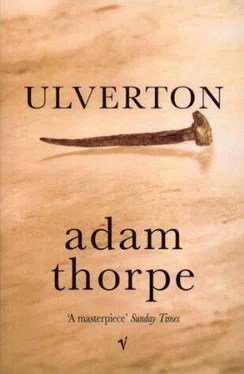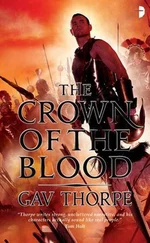This, then, is the only evidence, dear reader, of all the bustling and moisture and thirst and singing that is harvest-time — but how poignant, how much more poignant, this evidence! And for how long will this precious spill — for precious it is indeed, in the thrifty world of the countryside — be allowed to lie in the dust, to be trampled into oblivion by hooves and cart-wheels?
Plate XXXII DRAWING THE WATER
Banish from your imagination that Biblical scene when Christ approached the woman at the well, in which the young girl no doubt sports a fair complexion, and pretty hands, and a lithe figure — and replace it, I dare suggest, with this image now before you. No pump or well, in this end of the Village (named, appropriate baptising! Back Lane) but a muddy brook beside a rotting gate-post, which surfaces sullenly from its subterranean passage at this point, and several others, along with its cargo of excrement, and drowned rats, and other choice items off the muck-hills, that are regularly heaped up against the cotter’s walls.
Replace, then, the young beauty of your illustration with this actual villager (a Mrs Eliza Pyke): for those sturdy buckets on that sturdy yoke are filled to the brim, and may not be transported by pretty hands, and a lithe figure — but by the form you see before you. It is not a want of fellow-feeling has made her taciturn of expression, but the chafing rub of the wood upon her shoulders. It is not indulgence has puffed out her features, but an eternal died of white bread and weak tea. She has no need of refinement of posture, or of gesture. Lest she stand fair-square and broad — her back would break.
Where is the water bound? It is washing day. The tub will soon be out, the soil-caked garments soaked and scrubbed — but there is no mangle in Back Lane; no mangle but the arms and hands you see before you, soon to be slapping and twisting and pummelling — for do not pretend to yourself, in your mobile imagination, that those heavy garments will steam merrily before a blazing hearth, when it is wet without (as it was that day). In Back Lane, in Ulverton — in the downland heart of our great and glorious Empire — there are no blazing hearths, but only smoke. Alas, that the necessary minute of exposure has blurred those foul billows to a vague, smudged whiteness across the roofs! For this is smoke which would (if the doors were shut fast) choke the occupants to an untimely death, surpassing far the vile air of Manchester or London — and causing one’s attention, on passing these miserable hovels, to be caught by the litany of coughing within: the heartbreak treble of the children, or the bass clatter of a father scouring his lungs. For firewood, dear reader — the kind stacked brittle and dry, perhaps, in your orchard (if you are not partial to coal) — firewood does not grow on trees. It must be gathered, or paid for: and few are the places left for gathering, in this Kingdom of the partridge and the hare!
So do not forget, when you next peruse that holy passage, or don your clean silk stocks — do not forget this image, lest vanity take you by the hand, and lead you from heavy-shouldered Truth to the whirling drapery of Illusion.
Plate XXXIII DUSK IN THE WOODLANDS
A forest of beech in the summer, seen from without, presents a blank wall of leaf, until (if the wood be viewed from the correct compass-point) the ebbing sunlight, from one flank or the other, shafts through the midst, the front wall of trees grows dark in silhouette, and Nature reveals, as in a suddenly pellucid pool, the secret heart of the wood. This effect is more pronounced, perhaps, in winter, when the natural shadows of the wood still render it opaque from the outside, but the absence of leafage allows a startling brilliance of bronze, or copper, or a bloody red, to strike the boles and trunks of the interior, and as it were illuminate the hidden soul, on a fine dying afternoon. Beech woods, of which there are an abundance around our village, favouring as they do the chalk soil, are the true friends of the photographer: their sinuous lengths, unencumbered by ground shrubbery, rise as the pillars of a cathedral to their exultant heights of transpicuous, gauze-thin leafage.
Until the impossible is gained — and the myriad colours of the universe are arrestable likewise on our silvered plates — we must be content with the play of light and shade, the infinitesimal tremble of texture and tone in a moment’s grace, the unencumbered beauty of Nature’s pen that brings through our lens, as a richly-laden camel through the eye of the needle, her unsurpassable artistry. So this straddling copse, called Bayleaze Wood, of a spring evening, with the breath of night on the air, and the sweet breath of day folding itself onto the forest floor, becomes the entranced glimpse of a better world, where mystery is gilded, and a thousand paths open up where only a screen stood before.
But wait — there is a human figure: poised beside the broad tree on the extreme left, his pale hat chiming with the creamy stroke of the lopped bole on the far right, he stands proudly in his domain — for this is the woodcutter, sharp axe in hand; though he be but a dwarf, but a dab of dark leather, in this gargantuan realm.
Plate XXXIV PEASANT WOMAN, OR ‘FORTITUDE’
The portrait study, with its long ancestry, and its popularity with those who wish their features, at a certain moment in life, to be recalled without the smoothing generosity of the painter’s brush, remains the most illustrious, but also the most easily facile, of all photographic subjects. I confess that, for my living, and to keep in servants, I crowd my studio with the good and the great of our fustian county — magistrates, doctors, barristers, professors, divines, and so forth. But now and again I cajole one who would otherwise never set foot in my room, clamp the head of one who would otherwise remain in a fog of others’ memories (until the passage of time had eroded even that brief retainment of uniqueness) and etch each wrinkle, each pockmark, each hair, upon a tablet that dares eternity — for there are no flawed elements to the eye of the camera, but only the God-given grace of living appearance, that holds in every line the years endured, and the spirit borne.
This portrait is my most-loved, but not for beauty: Miss Hannah Heddin (now lately deceased) was sixty years of age when this portrait was taken: her mouth shows a severity — she was never known to smile; but her eyes — see how their hooded lids conceal beneath them a natural gaiety, that is not quite quenched! See how the hands, resting upon the hem of her simple (and threadbare) shawl, for all their chapped sturdiness, and arthritic curves, speak of younger days still — in that brass ring about which the skin has folded up, as a field folds up about a boulder. Only the Gainsboroughs amongst the painters can hope to emulate this poignant entrapment of the years — in which the face itself is, as it were, its own artist; and the photographer the humble recorder with his tricks of glass and light.
And do you see, in this grim-faced, wind-ravaged visage, these fingers that have grappled with unyielding flints, and frost-clung roots — do you see something deeper, more unyielding still, than simple endurance of poverty and air? For I have captured for posterity a portrait of the Outcast, an example of Fortitude in the face of scorn and isolation. Owing to some hidden sin effected long ago, involving (as far as I can gather) the deposition of fatal evidence, in the aftermath of ‘that trouble’ (see Plate XXX, ibid .), she has been cast into a realm, as terrible and solitary as if she, too, had been sent to the Antipodes, and suffered its blazing heat and deep loneliness. If I could have recorded the silence she endures, and the spittle of children, whenever she ventures from her outlying cot — how shallowly you would see the spirit of Forgiveness entered into our communities, and how grand the tragedies played on this our tiny stage!
Читать дальше










